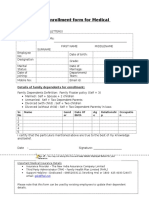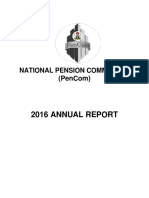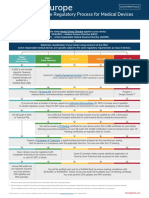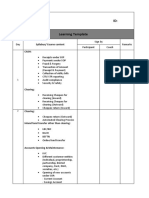Communication Policy
Communication Policy
Uploaded by
Aahna MittalCopyright:
Available Formats
Communication Policy
Communication Policy
Uploaded by
Aahna MittalCopyright
Available Formats
Share this document
Did you find this document useful?
Is this content inappropriate?
Copyright:
Available Formats
Communication Policy
Communication Policy
Uploaded by
Aahna MittalCopyright:
Available Formats
Communication - Policy and Procedures
Communication Management
Purpose
This policy provides details of XYZ Pty Ltd (XYZ) approach to communication.
The purpose of the policy is to provide principles to guide the communication practices of XYZ staff.
This policy applies to all XYZ staff.
Policy and Procedures
Our information management policy considers:
Continuous improvement – to streamline our policy and improve the effectiveness of our
internal and external communication
Technology – to apply latest technology to our communication effort
Compliance – with relevant legislation and regulations
Consistency – we speak with one voice to reflect our values and to ensure our message is
correct and consistent
Communication channels include:
Print – press releases, marketing material
Website
Social media platforms – LinkedIn, Facebook, Instagram
Surveys to clients, suppliers and staff
Emails
Mobile
Video
Internal newsletters and bulletins
Shared drives
Communication Policy Page 1 of 3
Communication - Policy and Procedures
CRM
Financial management system
The following applies:
Each area manager is responsible and accountable for the way communication is managed in their
department.
The HR manager is responsible for training all XYZ staff on communication practices
The area manager approves communications from their department, except essential press
releases or communication with key stakeholders
All information used for external communication must follow XYZ’s communication and marketing
guidelines
In our communication we value:
Understanding and respect for diversity
Professional demeanour
Respect for differences of opinions
A civil work atmosphere
Responding to communication
Generally, respond using the same method as the original communication (eg if you receive an email,
reply by email).
Timeframes
Respond in the following timeframes wherever possible:
Email same day
Social Media same day
Memos within three (3) working days of receipt
Letters within three (3) working days of receipt
Telephone calls within 2 hours (business days)
Communication Policy Page 2 of 3
Communication - Policy and Procedures
Communication formats
Use the Style Guide in the Marketing Policy for specific presentation guidelines.
The following general guidelines apply:
o Use courtesy titles (Mr, Ms, etc) in the inside address of external correspondence. Use the
addressee’s first name if the person is well-known to you.
o Do not use courtesy titles in the close of external correspondence.
o Do not use courtesy titles in internal correspondence (memos and emails).
o Letters should close with Yours sincerely if the addressee’s name is shown in the inside
address; Yours faithfully if the addressee’s name is not shown in the inside address.
Inclusive language
Comply with cultural protocols by using correct titles, e.g. Aunty, Uncle, Misses.
Use non-sexist and non-racist language by:
o avoiding male-dominated terms. For example, use ‘chair’ or ‘chairperson’ instead of ‘chairman’.
o eliminating the unnecessary use of the person’s gender, e.g. ‘female manager’
o avoiding the use of pronouns such as ‘he’ or ‘she’. Use ‘their’ instead of ‘his’ or ‘her’.
Signatures
The Area Managers are responsible for correspondence in their departments. They may authorise
supervisors to sign standard communication in some circumstances.
External Communication – Approval
All external communication must be approved by the Marketing Manager. Please refer to the Marketing
policy.
Communication Policy Page 3 of 3
You might also like
- Numerical Scale Performance Review Form: Employee: Employee Title: Supervisor: Performance PeriodDocument3 pagesNumerical Scale Performance Review Form: Employee: Employee Title: Supervisor: Performance PeriodGlobalInfinity InfinityNo ratings yet
- Tender Waiver Form 2015Document6 pagesTender Waiver Form 2015ahtin618No ratings yet
- Job Description FormatDocument3 pagesJob Description Formatprithvee_khushbooNo ratings yet
- Sample Tobacco-Free Workplace Policy: Ceo Cancer Gold StandardDocument2 pagesSample Tobacco-Free Workplace Policy: Ceo Cancer Gold Standardsidrah_farooq2878100% (1)
- Job Description TemplateDocument2 pagesJob Description TemplateromeeNo ratings yet
- Main HR Roles and ResponsibilitiesDocument2 pagesMain HR Roles and Responsibilitiesshail1985No ratings yet
- Probation - Policy 2021Document11 pagesProbation - Policy 2021ABHINAV KAUTUKNo ratings yet
- Leo Corp Serg AppraisalDocument6 pagesLeo Corp Serg Appraisalar15t0tleNo ratings yet
- HRD 16 Employee Warning NoticeDocument1 pageHRD 16 Employee Warning NoticeHOSAM HUSSEINNo ratings yet
- Reference Check TemplateDocument9 pagesReference Check TemplatePhuong CaoNo ratings yet
- Career Development Program by DEMDocument12 pagesCareer Development Program by DEMDante Manansala Jr.No ratings yet
- Employee ServicesDocument36 pagesEmployee ServicesJasonNo ratings yet
- Bio Metric Punch in Punch Out Policy For EmployeesDocument4 pagesBio Metric Punch in Punch Out Policy For EmployeesniteshvnairNo ratings yet
- Employee Handbook Template 32Document17 pagesEmployee Handbook Template 32Gordon LeeNo ratings yet
- Internal Application GuidelinesDocument1 pageInternal Application GuidelinesiloveggNo ratings yet
- Progressive Discipline PolicyDocument4 pagesProgressive Discipline Policyrip982No ratings yet
- Recruitment and Selection PolicyDocument12 pagesRecruitment and Selection PolicySaad MasudNo ratings yet
- Candidate Application Form - KPMGDocument6 pagesCandidate Application Form - KPMGChethan VenkateshNo ratings yet
- Performance Evaluation Form 2020-21Document4 pagesPerformance Evaluation Form 2020-21Faisal AwanNo ratings yet
- 10 - Performance Evaluation FormDocument3 pages10 - Performance Evaluation FormhassaanpmsgroupNo ratings yet
- Division of Operations - General Services: Housekeeping Performance Review FormDocument9 pagesDivision of Operations - General Services: Housekeeping Performance Review FormTrâu XjnhNo ratings yet
- Group 2 Assignment HRMDocument25 pagesGroup 2 Assignment HRMhailegebraelNo ratings yet
- Interview Assessment FormDocument1 pageInterview Assessment FormCathleya Marie CoNo ratings yet
- Letter of Extension of Probationary PeriodDocument1 pageLetter of Extension of Probationary PeriodfaezahmanjaNo ratings yet
- Standard Employee Joining FormDocument3 pagesStandard Employee Joining Formanju sanalNo ratings yet
- Human Resources PresentationDocument8 pagesHuman Resources Presentationapi-299534152No ratings yet
- My Joining KitDocument11 pagesMy Joining Kittanmoy720No ratings yet
- Leave Policy: Prepared By-Approved by - With Effective From - Last ReviewDocument6 pagesLeave Policy: Prepared By-Approved by - With Effective From - Last ReviewAsfac TasfacNo ratings yet
- Induction ChecklistDocument1 pageInduction ChecklistDhilip AnNo ratings yet
- JD - HR & Admin ExecutiveDocument2 pagesJD - HR & Admin Executiveジョン ポールNo ratings yet
- Employee Exit Interview FormDocument2 pagesEmployee Exit Interview FormOR-DR AREANo ratings yet
- Rehire PolicyDocument1 pageRehire PolicySurabhi KumarNo ratings yet
- Exit Interview Form - GoglocalDocument2 pagesExit Interview Form - Goglocalgotoyex612No ratings yet
- Staff Disciplinary CodeDocument4 pagesStaff Disciplinary CodeOwunari Adaye-OrugbaniNo ratings yet
- HR GeneralistDocument5 pagesHR GeneralistAllan Amante Jr.No ratings yet
- Promotion: by Sonu VermaDocument22 pagesPromotion: by Sonu Vermaaman kumarNo ratings yet
- DEV106 Employee DisciplineDocument10 pagesDEV106 Employee Disciplineanon_767426757No ratings yet
- RH - HR - D19 - Company Asset PolicyDocument5 pagesRH - HR - D19 - Company Asset PolicyNoha TawfikNo ratings yet
- DC7.4 Alcohol & Substances Abuse Declaration - v1 - 18.11.20Document1 pageDC7.4 Alcohol & Substances Abuse Declaration - v1 - 18.11.20lhyna aidaNo ratings yet
- Employee Leave PolicyDocument3 pagesEmployee Leave Policyladdu30No ratings yet
- Reference Check FormDocument3 pagesReference Check Formkrystelsmalls100% (2)
- HR Training Evaluation FormDocument2 pagesHR Training Evaluation FormRichard R M ThodéNo ratings yet
- Rules and Regulations For All International HousesDocument3 pagesRules and Regulations For All International HousesHenryy555No ratings yet
- HR Policy: 1. General 1.1 Short Title, Extent and CommencementDocument12 pagesHR Policy: 1. General 1.1 Short Title, Extent and Commencementskywalk buildersNo ratings yet
- Transfer Policy - Template - 4Document10 pagesTransfer Policy - Template - 4Kanika ChhabraNo ratings yet
- Recruitment in IBMDocument19 pagesRecruitment in IBMshambhavi06No ratings yet
- HR Retention & Motivation CourseDocument13 pagesHR Retention & Motivation CourseAZNo ratings yet
- Group Medical PolicyDocument28 pagesGroup Medical PolicyMuthuchziyan KathiresanNo ratings yet
- Company Travel PolicyDocument4 pagesCompany Travel PolicyKi PoiniNo ratings yet
- Employee Uniform Responsibility FormDocument1 pageEmployee Uniform Responsibility FormChona Faith DobleNo ratings yet
- NLADocument11 pagesNLAPedro CardosoNo ratings yet
- 18.medical Insurance Enrollment FormDocument2 pages18.medical Insurance Enrollment FormKratika PandeyNo ratings yet
- Hygiene & FSSAI StandardsDocument29 pagesHygiene & FSSAI StandardsSuchithra DeviNo ratings yet
- Sample Letter Invitation To Attend Meeting To Discuss Putting in Place A Performance Improvement PlanDocument2 pagesSample Letter Invitation To Attend Meeting To Discuss Putting in Place A Performance Improvement PlanhenryNo ratings yet
- Employment ContractDocument5 pagesEmployment ContractAlankar NarulaNo ratings yet
- Employee Accommodation Policy: Ramana Gounder Medical TrustDocument22 pagesEmployee Accommodation Policy: Ramana Gounder Medical TrustAaju Kausik100% (1)
- Reference Check Form - Wordv1Document2 pagesReference Check Form - Wordv1Sahir AliNo ratings yet
- Visitor Log BookDocument2 pagesVisitor Log BookamanatbuttNo ratings yet
- Procedure of Punishment For Conviction and MisconductDocument4 pagesProcedure of Punishment For Conviction and MisconductAnonymous 1LcDs26jL5No ratings yet
- History of Banking in IndiaDocument3 pagesHistory of Banking in IndiaratneshcfpNo ratings yet
- NATIONAL PENSION COMMISSION PenCom 2016 PDFDocument113 pagesNATIONAL PENSION COMMISSION PenCom 2016 PDFstive MorgenNo ratings yet
- The Regulatory Process For Medical Devices PDFDocument1 pageThe Regulatory Process For Medical Devices PDFHilario AlinabonNo ratings yet
- BUS 305 - Lecture 11 - Financial Management 2 and Good To Great SummaryDocument13 pagesBUS 305 - Lecture 11 - Financial Management 2 and Good To Great Summarysam lissenNo ratings yet
- Types of Defective ContractsDocument9 pagesTypes of Defective ContractsCaren Que ViniegraNo ratings yet
- Business Management AssignmentDocument6 pagesBusiness Management AssignmentNehaCruiseNo ratings yet
- Apprenticeship in India - Challenges OpportunityDocument14 pagesApprenticeship in India - Challenges Opportunityapi-288608374No ratings yet
- Aiqs Edc Practice Standard 2024Document25 pagesAiqs Edc Practice Standard 2024Rastin BadrzadehNo ratings yet
- Concrete Formwork Suspended SlabDocument5 pagesConcrete Formwork Suspended SlabKate HopleyNo ratings yet
- Brief of Sun-Maid Growers of California As Amicus Curiae in Support of Respondent, No. 12-123 (Feb. 21, 2013)Document11 pagesBrief of Sun-Maid Growers of California As Amicus Curiae in Support of Respondent, No. 12-123 (Feb. 21, 2013)RHTNo ratings yet
- Carta de La Junta de Supervisión A La AEE y La UtierDocument3 pagesCarta de La Junta de Supervisión A La AEE y La UtierEl Nuevo DíaNo ratings yet
- Commissioner of Internal Revenue VsDocument4 pagesCommissioner of Internal Revenue VsKyla BinayaoNo ratings yet
- CH 12Document30 pagesCH 12Iriş MihaelaNo ratings yet
- 6GK7 242-5dx30-0xe0Document1 page6GK7 242-5dx30-0xe0Ngô Trí DũngNo ratings yet
- SUMMARY of PD 1096 Pertinent ProvisionsDocument2 pagesSUMMARY of PD 1096 Pertinent ProvisionsMaria Veronica ParillaNo ratings yet
- Career Opportunity: Health Infrastructure Development and Management Company Limited A Company of Government of PakistanDocument3 pagesCareer Opportunity: Health Infrastructure Development and Management Company Limited A Company of Government of Pakistan03027813071No ratings yet
- HRM and EthicsDocument23 pagesHRM and EthicsSridhar KodaliNo ratings yet
- Cpa FlyerDocument2 pagesCpa FlyerDany KalfatNo ratings yet
- Quality Management System ManualDocument10 pagesQuality Management System Manualjaskaran singhNo ratings yet
- Coa M2013-004Document104 pagesCoa M2013-004Jobel Sibal CapunfuerzaNo ratings yet
- Chapter 3 Section 2Document46 pagesChapter 3 Section 2madelc_125% (4)
- Factors To Consider When Choosing The Right SolarDocument11 pagesFactors To Consider When Choosing The Right SolarAryan TiwariNo ratings yet
- Annex A1. Grant Application Form-Concept Note Res (En)Document12 pagesAnnex A1. Grant Application Form-Concept Note Res (En)khaled.narimaitreeNo ratings yet
- Lan Yuye Brock Offer PMPCDocument3 pagesLan Yuye Brock Offer PMPCapi-384261979100% (1)
- 147 Internal Audit ChecklistDocument9 pages147 Internal Audit ChecklistMarian Mihai100% (1)
- Participant's Name: Designation: Id: Branch: Learning TemplateDocument2 pagesParticipant's Name: Designation: Id: Branch: Learning TemplateJubaida Alam JuthyNo ratings yet
- Assurance Services and The Integrity of Financial Reporting, 8 EditionDocument19 pagesAssurance Services and The Integrity of Financial Reporting, 8 EditionFriista Aulia LabibaNo ratings yet
- Procurement Manual: Democratic Socialist Republic of Sri LankaDocument161 pagesProcurement Manual: Democratic Socialist Republic of Sri LankaHarshana PrabhathNo ratings yet
- General Essentials QA/QC Plan Sample: Good For Smaller Projects and Bid QualificationsDocument8 pagesGeneral Essentials QA/QC Plan Sample: Good For Smaller Projects and Bid QualificationsBaher ElsheikhNo ratings yet
- Bharti Axa Life InsuranceDocument81 pagesBharti Axa Life InsuranceJitin Bhutani100% (1)

























































































